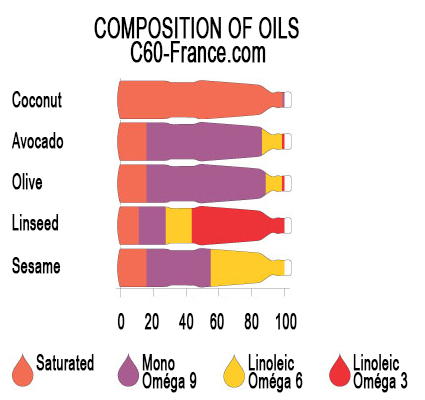You can choose from 3 oils in our range of C60 oils. But how to make this choice? As we will see, this choice remains a decision that is personal to you, adapted to your preferences and eating habits.
TASTE
As part of a daily intake, the taste of an oil should be your first criterion of choice. Indeed it must be a pleasure to your full vitality. Let's go over the taste of our C60 oils:
- Coconut oil: its gourmet perfume evokes holidays and monoi. Its taste is very light and neutral. It is obtained from the white pulp of the coconut, fruit of the coconut tree. Our coconut oil is fractionated, so it always stays liquid and does not freeze. The fractionation process (hydrolysis then distillation) makes it possible to remove or separate certain components such as long-chain triglycerides and to only preserve the medium-chain triglycerides. This process makes it possible to greatly improve the stability of this oil and to extend its life. This oil also has a very high concentration of capric acid and lauric acid, which gives it more antioxidants and disinfecting effects.
- Avocado oil: its scent is faithful to the fruit from which it is extracted. The flavor of avocado oil is very sweet, slightly herbaceous and more neutral than that of olive oil. It is an original oil that changes the habit. Our avocado oil is certified organic farming.
- Sunflower oil: It is a virgin oil, therefore extracted cold without any treatment other than mechanical. An oil extracted from crushed sunflower seeds. Very fluid, pale yellow, with a sweet flavor and a slight taste of hazelnut. It supports heat at high temperatures, so it is perfect for frying, browning and coloring foods. She is also very good in seasoning. Sunflower oil contains vitamin E, with recognized anti-oxidant properties. Our sunflower oil is certified organic farming.
- Olive oil: Olive oil is the queen of the kitchen for its remarkable qualities. Our supplier is an olive grower from our city, Salon de Provence. He owns his own mill, so he masters his entire manufacturing process. With only 1400 trees, he strives to perpetuate ancestral knowledge. It offers 5 different oils, from the sweetest to the most ardent, 17 medalists since 2005. It uses authorized products in organic farming. This is the guarantee for you of a product of excellence. We use a sweet oil, very spicy, which retains its typical Provencal character, obtained with a traditional variety of the Alpilles massif. Fine and round, it displays lively and fresh aromas of grapefruit and tomato.
AND DIETETICS ?
There are 3 major families of fatty acids.
Saturated fatty acids (found in meats, butter, milk), consumed in excess, tend to favor cardiovascular diseases by raising blood cholesterol levels. Fortunately, vegetable oils contain only a few, compared to animal fats (around 10% for most oils).
Polyunsaturated fatty acids are more interesting, especially omega-6 (linoleic acid for example) and omega-3 (alpha-linolenic acid or ALA). These fatty acids are called "essential" because our body can not synthesize them from other sources of food. It is therefore important to have some in its diet, especially thanks to vegetable oils. But omega-6, with their cholesterol-lowering properties, and omega-3 that participate, among other things, in cardiovascular protection, must be consumed in balanced proportions. Scientific studies advise an omega-6 / omega-3 ratio of less than 4: 1. However our diet is deficient omega-3 in favor of omega-6. There is a better understanding of the importance of looking for oils rich in omega-3 (the optimal ration of ALA is two grams per day).
The last family of fatty acids are monounsaturates. It is mainly oleic acid, omega-9, which takes its name from the olive oil of which it is the main constituent. Monounsaturates have a positive effect on metabolism, in particular helping to prevent cancers and autoimmune diseases and to protect against the occurrence of cardiovascular events. However in too large quantities (more than 50 g per day), some studies have shown that monounsaturated fatty acids could have the opposite effect by increasing the LDL, the "bad cholesterol".

It is therefore necessary to consume all of these fatty acids in balanced proportions. The ideal omega-9 / omega-6 / omega-3 ratio should be 10 / 2.5 / 1.
The olive and avocado oils are quite close to these proportions. These 2 oils are also very rich in antioxidants and various vitamins.
Coconut oil is quite special. Indeed it contains a rare combination of three fatty acids: lauric, capric and caprylic acid, which are among the rarest in nature. These medium-chain fatty acids (MCFAs) provide extraordinary health benefits; they are easy to burn during exercise and have antibacterial properties.
Coconut oil is particularly indicated for people who have gallbladder problems, because it is the only oil that does not require action of this organ.
We can note these benefits:
- Balance the hormonal system
- Eliminate candida
- Improves digestion
- Moisturizes the skin
- Reduces cellulite
- Attenuates wrinkles and age spots
- Balances blood glucose and improves energy
- Improves the condition of people with Alzheimer's
- Increases HDL ("good cholesterol") cholesterol and lowers LDL
- Burns fat
WHAT TO CHOOSE ?
In conclusion, the choice will depend on your diet. If you have little oil or oilseeds in your diet or you eat a lot of red meat, prefer avocado oil.
If you already have oils, take olive oil, it has incomparable benefits.
If you want to monitor your cholesterol, regulate the hormonal or digestive systems, take coconut oil. Our oil being fractionated, it will always remain liquid.

